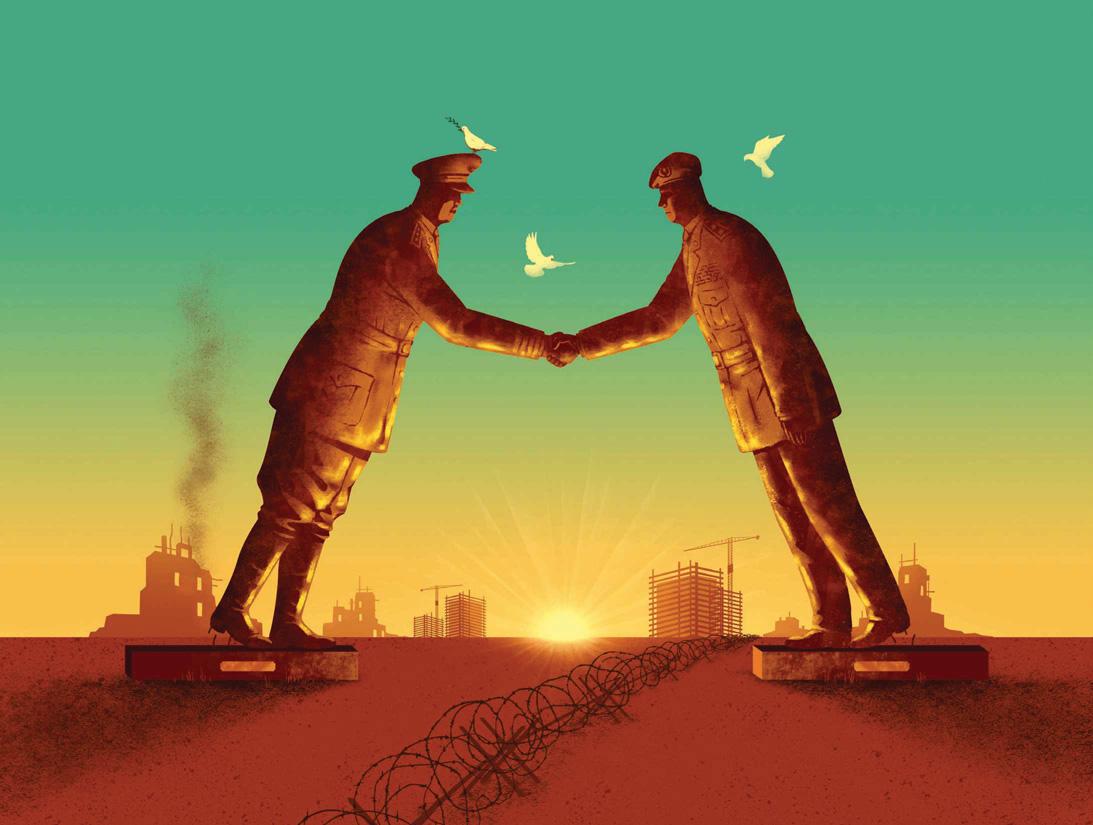Prøve GULL - Gratis
How do intractable conflicts come to an end?
BBC History UK
|Christmas 2023
The Israel-Gaza war is dominating the news at the moment, but rather than exploring its roots, I wanted to discuss other examples of seemingly intractable conflicts and how they come to an end. What examples from your research would you like to highlight?

Rana Mitter Firstly, we would all hope for a resolution of these conflicts, in the Middle East and elsewhere. What history allows us to do is to look at the longer perspective and understand that sometimes conflicts that have gone on for years or even decades can eventually be resolved, and that sometimes it’s external factors and sometimes it’s internal factors that enable that to happen.
As a historian of modern China, I can offer two examples that provide a contrast. One is the relationship between India and China ever since the former gained independence in 1947 and the latter saw the establishment of Mao’s regime in 1949. Growing tensions between the two came to a head in 1962 with a small but very vicious war, and there have been border disputes ever since. This territorial dispute between the two Asian giants has never actually been resolved because of an issue of geography: there is an area of the Himalayas which is essentially most of the Indian state of Arunachal Pradesh, but which China argues should be Chinese territory. The two sides have never managed to resolve that dispute.
That’s in contrast with another example in which a seemingly endless conflict did come to an end: China’s war with Vietnam. In February 1979, China and Vietnam went into a short but very bloody war in which tens of thousands were killed on both sides. Across the following decade there were continuing border battles. Eventually, in 1990, a secret conference held in the Chinese city of Chengdu brought a resolution and in 1991, China and Vietnam signed a lasting border agreement. It’s an example of the way in which a resolution can sometimes be found to seemingly intractable conflict.
Hannah Skoda
Denne historien er fra Christmas 2023-utgaven av BBC History UK.
Abonner på Magzter GOLD for å få tilgang til tusenvis av kuraterte premiumhistorier og over 9000 magasiner og aviser.
Allerede abonnent? Logg på
FLERE HISTORIER FRA BBC History UK

BBC History UK
On the skids
Richard Rodgers and Oscar Hammerstein II's smash musical Oklahoma! opened on Broadway on 31 March 1943.
1 min
Christmas 2025

BBC History UK
Small pleasures
Memory is imperfect, but what if you could get a professional model maker to recreate a moment from the past?
1 min
Christmas 2025

BBC History UK
Bath in five places
In the Georgian era, Bath became arguably Britain's most fashionable destination. KIRSTEN ELLIOTT promenades five historic highlights
3 mins
Christmas 2025

BBC History UK
End times
Why do civilisations that dominated their epoch fail? In an era of autocracy, climate change, the rise of Al and a first-hand understanding of how deadly pandemics can be, it's a question that seems pertinent.
1 min
Christmas 2025

BBC History UK
What are the origins of the Yule Lads?
To learn about the Jólasveinar (Yule Lads), we must start with their mother, the terrifying ogress Grýla. Her name appeared in Icelandic texts as early as the 13th century, although it wasn’t until later that those 13 mischievous lads became associated with her. Folk tales and poems tell how she descends from the mountains with an empty sack to stuff full of children. Grýla owns the monstrous Jólaköttur (Yule Cat), which roams the countryside on Christmas Eve, searching for children to gobble up if they're not wearing new clothes.
1 mins
Christmas 2025

BBC History UK
Santa Claus v Father Christmas
The true identity of the white-bearded, red-robed figure who fills children's stockings at Christmas has long been debated. Thomas Ruys Smith sizes up the merry contenders
8 mins
Christmas 2025

BBC History UK
Frontier friction
Set in Washington Territory in 1854, The Abandons is a Western that's unusual for having two matriarchs, women whose lives become entangled, at its centre.
1 min
Christmas 2025

BBC History UK
The Last Days of Pompeii: The Immersive Experience
Delve into the culture of daily Roman life, witness the momentous eruption of Mount Vesuvius, and follow its fallout in Immerse LDN's new exhibition. In a blend of cutting-edge technology and vivid storytelling, this exhibition launches visitors into Pompeii's rich history with recreations of the ancient city's beautiful pre-eruption landscape, a 360-degree virtual reality Roman amphitheatre experience, and a digital metaverse recreating Pompeii's 'Villa of Mysteries'.
1 min
Christmas 2025

BBC History UK
Elizabeth Marsh The corsair's captive
Taken hostage by a Barbary ship's captain in the 18th century, a young Englishwoman found herself fighting for her freedom in Marrakech. ADAM NICHOLS introduces a brave captive who later wrote a book about her dramatic experiences
6 mins
Christmas 2025

BBC History UK
29 DECEMBER 1170: Thomas Becket is murdered in Canterbury
Knights loyal to Henry II rid him of the “low-born cleric”
2 mins
Christmas 2025
Translate
Change font size
